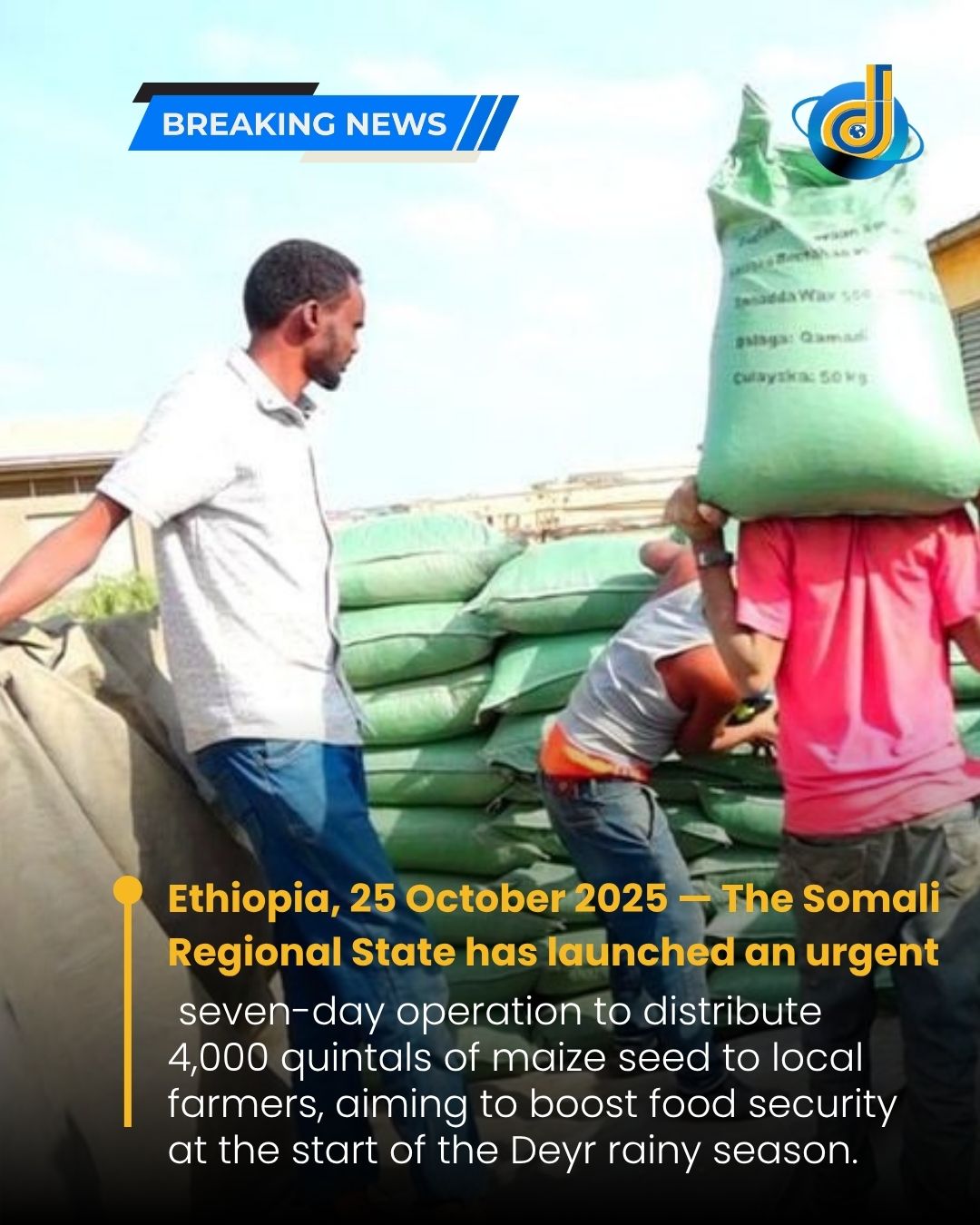Before it rains, the Somali Regional State sends farmers maize seeds.

Ethiopia, 25 October 2025 — The Somali Regional State has launched an urgent seven-day operation to distribute 4,000 quintals of maize seed to local farmers, aiming to boost food security at the start of the Deyr rainy season.
The distribution drive, a collaborative effort between the Seed Selection and Livestock Feed Agency and the Regional Bureau of Agriculture, targets farmers across seven of the region’s 11 zones, encompassing 39 districts.
The initiative comes as the regional administration seeks to maximize agricultural productivity during the Deyr season, which traditionally runs from October to December.
The Director of the Seed Selection Agency, Abdullahi Mohamed Farah, said the operation was launched to ensure farmers plant on time and make full use of the Deyr rains.
“We are making sure the seeds reach every zone and district on time so that farmers can plant during the proper period of the Deyr rains, which have now begun,” said Abdullahi.
Agency officials are closely monitoring the delivery process to ensure equal and fair distribution across all target locations.
Despite the proactive measures, the effort faces a major challenge: the prevailing regional climate outlook.
The 2025 Deyr rainfall forecast indicates that rainfall levels will likely be below average across much of the Horn of Africa. While there is a possibility of near-average rains in isolated pockets, including parts of the Somali Regional State, the overall outlook remains guarded.
The Seed Selection Agency has urged farmers to use the seed efficiently and responsibly. Officials expressed hope that the 2025 Deyr farming season will nonetheless prove productive, increasing both yields and local household income across the region.
Mogadishu (DALSAN TV) - Small farmers in the southwestern Somali district of Baidoa have been rushing to harvest their precious cereal crops prematurely to salvage what they can before locusts destroy everything.
Sadiya Maadey Ibrahim, a farmer living with her family in Salbuuy, 18 km south of Baidoa, said that as soon as she heard locusts had been seen in Bay region, she moved quickly to harvest her hectare of maize and sorghum early.
“The maize was still green, as it wasn’t due to be harvested until the end of February, but we were forced to salvage what we could,” Sadiya told Radio Ergo.
These were the first crops the family has planted in five years. Having suffered years of drought, she, her husband and eight children returned to the village last October when there was good rainfall. They had been living in an IDP camp in Baidoa town called Liban 1 camp, where life was miserable.
“We were given two million Somali shillings ($62) by my relatives to come back and resume farming,” Sadiya said. “My family has been dependent on aid for too long.”
The problem now is how to dry the unripe grain. Sadiya has put the sorghum seeds onto plastic bags laid out on the ground and covered them with more plastic to protect them from the locusts.
The situation in this breadbasket region of Somalia is fast becoming desperate for many families. The local farmers’ association told Radio Ergo that people began reaping their sorghum and maize in early January when locusts were reported to have descended on Bay region.
The farms worst affected are those located between Baidoa and Bardale and others in Awdinle, west of Baidoa.
Faduma Mohamed Ahmed, a farmer in Misgaale, harvested all her sorghum, maize and beans as soon as the locusts started to appear.
“The news about locusts created a lot of confusion. People were saying, ‘they are coming, they’ve reached a nearby village.’ So we took our equipment and started to harvest our crops as fast as we could.”
